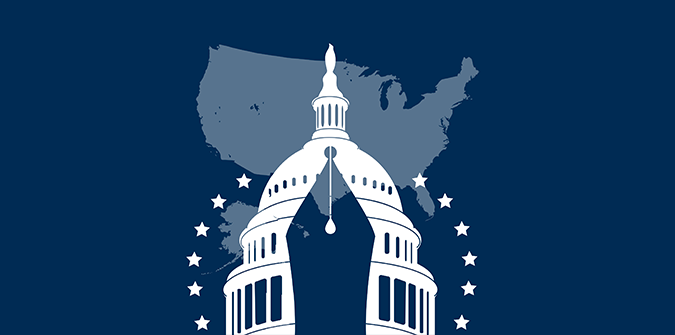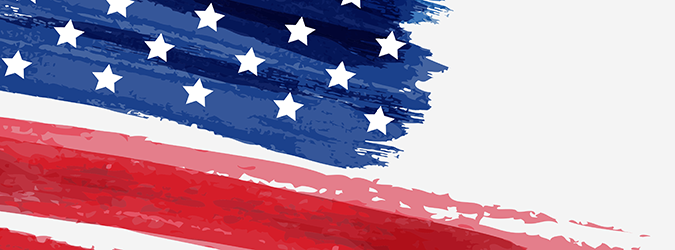From the Congo to the U.S.: A Singular Appreciation of the U.S. Constitution
7.5.2022
In recognition of Constitution Day, Jennifer Smith spoke with Laetitia N. Basondwa. Basondwa was born and grew up in the Democratic Republic of Congo, also known as Congo-Kinshasa. She became a naturalized citizen of the United States and currently practices law in the Washington, D.C. area. The two met through NYSBA’s Law, Youth and Citizenship Committee.
SMITH: What is your coming to the United States story?
BASONDWA: Every year, approximately 55,000 individuals apply for visas to enter the U.S. through a program known as the diversity lottery. The diversity lottery allows citizens from countries with historically lower volumes of immigration to the U.S. to apply for the program. The winners are determined through a random drawing from among millions of people who enter each year. I was one lucky recipient of the program and decided in 2009 to give myself a chance to experience my own version of the American Dream.
SMITH: What was the process of becoming an American citizen like? How important was the civics education aspect? Do you feel like you still have things to learn?
BASONDWA: The process was straightforward in my case. By the time I submitted my application for naturalization to the Department of Homeland Security, United States Citizenship and Immigration Services (USCIS), I had lived in the U.S. for more than five years and met all other citizenship eligibility requirements, e.g., adjudged to be of good moral character and continuously, physically resided in the U.S. for at least five years. I was working as a paralegal for a well-known immigration lawyer in the Maryland area who helped me complete and submit my application. After submission, the USCIS scheduled me for a fingerprint collection to run a criminal background check. Then, once I passed, I was scheduled for an interview with a USCIS agent. One interesting aspect of the naturalization process is the civics test, which I believe is unique to the U.S. citizenship process. Applicants must have a knowledge base of – and must study 100 questions about – U.S. government and history. During the interview an applicant must answer six of 10 questions correctly. There is no formal training or official material to prepare for the test, except to learn the answers to the 100 questions.
I studied U.S. history and government in high school and law school in the Congo, so the civics test was a good opportunity for me to revisit crucial aspects of the U.S. system and history that I already knew and helped me to contextualize new things as well. It also stimulated my curiosity to get clarity about American democratic values and important U.S. historical events and figures. For context, I applied for naturalization toward the end of the year 2014, in the middle of the Ferguson protests. At the time I was pursuing a master’s degree at American University Washington College of Law and was struggling to comprehend what was happening in the U.S. My education about U.S. democratic values and history gave me a biased impression of the U.S. In general, American history programs in African schools do not cover some deplorable but crucial events and result in a perception of a perfect American society by young Africans.
SMITH: So, you are saying the U.S. is presented as a “shining City on a Hill” and some of the more painful episodes from our past, or times when the U.S. arguably has not lived up to its democratic ideals, have been glossed over or excluded altogether?
BASONDWA: Exactly. The U.S. is presented as the “Utopia.” I remember absorbing things like the fictional Rambo character from the movies and the idea of the U.S. as a singular force. But after I had been living here for a few years and while preparing for the test, I learned it takes lots of people and time to achieve the Big Dream! And I was able to determine what values, historical events and figures are important to the American nation and what has made the United States the world’s most powerful country. I was particularly fascinated by real-life people like Abraham Lincoln. I still have to learn more about figures like Alexander Hamilton and James Madison.
SMITH: You are an immigration attorney – did your experience of going through the immigration/naturalization process influence your choice of profession?
BASONDWA: Yes and no. My experience working as a paralegal and also volunteering to help at immigration service nonprofits influenced my decision to become a U.S. citizen. Immigration has always been a key issue in the United States. As a U.S. legal permanent resident and not a citizen, I had the right to live and work in the U.S. indefinitely but could not vote. I wanted to be able to vote and influence decisions on immigration. Because I came as a recipient of the diversity lottery visa, when I first arrived in the U.S. I was not aware of the struggle some immigrants face after fleeing persecution in their country or while trying to reunite with loved ones. While helping immigrants obtain protection in the U.S., I was amazed by the U.S. immigration system and its uniqueness and wanted my contribution to have a greater impact. Going through the naturalization process gave me clarity about my contribution as a lawyer. As a first-generation American, I knew I could bring a unique perspective to the representation of immigrants and foreign businesses. As much as I recognize that the U.S. immigration system values and promotes basic human rights, it is also flawed. For example, the U.S. immigration laws attempt to protect immigrants who are survivors of domestic violence and victims of certain crimes, such as human trafficking. However, some people who have fled their countries as a result of persecution and have applied for protection pursuant to those laws have to wait for years for the adjudication of their application. Some of them have lost their family members while waiting.
SMITH: What do you wish more Americans understood about going through the immigration process?
BASONDWA: Citizenship through naturalization is a privilege, not a right.
SMITH: Let’s circle back to our theme – the U.S. Constitution. What does it mean to you?
BASONDWA: “Government of the people, by the people, for the people.” Before coming to the United States, I lived most of my life under an authoritarian regime. Democracy was a theory that I had learned in school and could only dream of. I experienced firsthand how a dictatorship can make use of a constitution as a weapon in politics and allow for the instrumentalization of the law and neutralization of values in law. Most countries under dictatorships amend their constitution to allow sitting presidents to remain in power indefinitely; some countries adopt a new constitution for the same purpose. My native country has changed its constitution four times in 20 years, and the current constitution has been amended a couple of times. Many will agree with me that the U.S. Constitution symbolizes the model (ideal) of democracy.
SMITH: How does the U.S. Constitution continue to impact your life today?
BASONDWA: The U.S. Constitution has played an essential part in my life and career, in a way that has allowed me to understand and comprehend that “justice” is not merely a concept or an idea frozen in time but the result of the people’s will to live together as one nation and protect human life. When one looks at the different Supreme Court rulings related to issues like the right to privacy, you can see how the American society’s approach has evolved in time. As an officer of the court I am honored and privileged to participate in the U.S. legal system.
SMITH: What is the thing you wish Americans would not take for granted about the Constitution?
BASONDWA: The Bill of Rights. My life journey started in a dictatorship. The Bill of Rights gives the U.S. Constitution its sacred aspect and makes it the “ideal” for other nations. The Bill of Rights is a document that defends majorities of people and minorities against abuses by governments (federal or state). It is the centerpiece in the “people’s” continuous fight for liberty and equality, which are inalienable natural rights.
SMITH: It is fitting that you mentioned the importance of the Bill of Rights given your experiences living under what you describe as an “authoritarian regime.” In his article, “Constitution Day: How the States Put Aside Differences To Become ‘We the People,’” [in this issue] Judge Albert Rosenblatt reminds us that initially the Bill of Rights was not unanimously embraced by the framers; however, the view of those prescient convention delegates afraid “that an unknowable centralized government could swallow up too much power” eventually carried the day. What can we do to safeguard the U.S. Constitution and ensure its health and resiliency for the next 235 years and beyond?
BASONDWA: I have always been amused by the artistic and cinematographic depiction of stories around the U.S. Constitution. Most of them result in a simplistic perception of, and in some cases undermine, the tremendous efforts, sacrifices and time required in the process of getting such a powerful document. Judge Rosenblatt does a great job of illuminating the truth of this process. As French speakers say, “Rome ne fut pas faite toute en un jour” (Rome wasn’t built in a day), and the United States as a nation should understand that the ideals of equality, rights, liberty, opportunity and democracy take time to achieve and one should not be discouraged by challenges faced by one’s generation in the pursuit of these ideals.
Laetitia Nyavingi Basondwa is managing attorney at Kasay Legal, an immigration and international business firm based in Silver Spring, Maryland. She holds bachelor’s and master’s degrees in law from the Protestant University of Congo, and an LLM from American University Washington College of Law.
Jennifer Smith is the executive director of the Equity in Law and Diversity Fund, a nonprofit working to promote access to justice and to diversify the legal profession through strategic partnerships and mentoring opportunities. Smith is a graduate of the Benjamin N. Cardozo School of Law.





